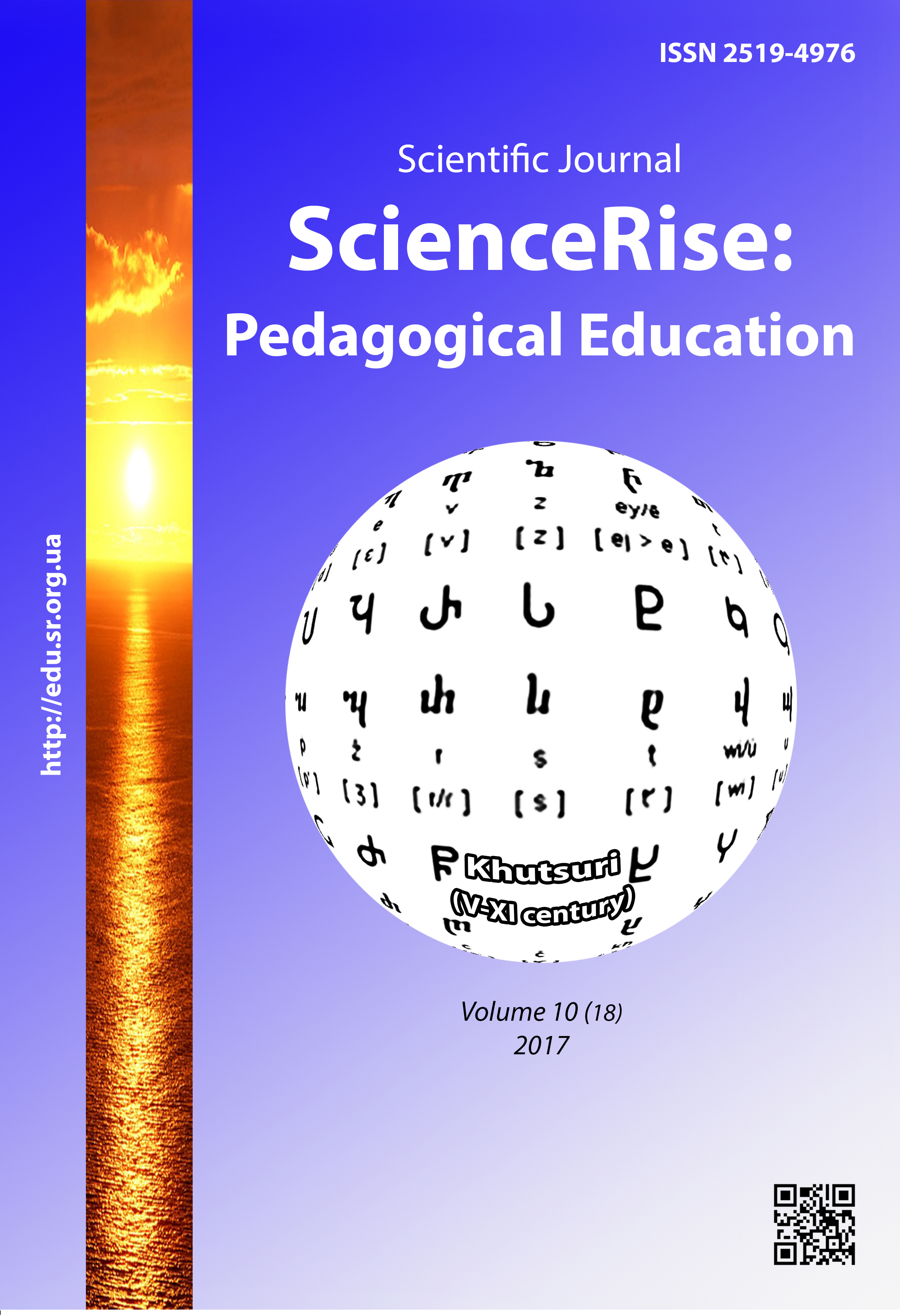Coordination of the process of development of professional competence of teachers of biology of agricultural schools in the conditions of the regional methodical associations based on the technology "DDI" (disclosure, development, and implementation)
DOI:
https://doi.org/10.15587/2519-4984.2017.112808Keywords:
teacher, biology, coordination, disclosure, development, implementation, competence, technology, innovation environmentAbstract
The article substantiates one of the scientific pedagogical conditions of professional competence of teachers of biology rural school district in terms of teaching unions – the coordination of development of professional competence of teachers of biology rural school district in terms of methodological associations based on technology "DDI" (disclosure, development, and implementation).
Technology "DDI" (disclosure, development, and implementation) is a gradient for the development of professional competence of teachers of biology of rural schools in the conditions of district methodological associations, which depends on the fulfillment of three conditions: the disclosure of the personal potential of the teacher of biology, its development and implementation for the successful organization of educational process in the school of the countryside , as well as for the good of society and ourselves.
The components of the personal potential of the teacher of biology of rural schools are determined: value, intellectual, spiritual-moral, aesthetic, emotional, communicative, creative potential.
The components of the innovative environment of the district methodical association of teachers are determined: the subject-resource component; material and technical component; ideological and technological component
References
- Kremenya, V. H. (Ed.) (2009). Bila knyha natsional'noyi osvity Ukrayiny. Kyiv, 185.
- Lyubchenko, N. V. (2010). Koordynatsiya yak funktsiya upravlins'koyi diyal'nosti naukovo-metodychnoho tsentru Universytetu menedzhmentu osvity NAPN Ukrayiny. Visnyk pislyadyplomnoyi osvity, 2, 83–89.
- Byrka, M. F. (2016). Systema profesiynoho rozvytku vchyteliv pryrodnycho-matematychnykh dystsyplin u pislyadyplomniy osviti. Zaporizhzhia, 438.
- Klokar, N. I. (2010). Pidvyshchennya kvalifikatsiyi pedahohichnykh pratsivnykiv v umovakh pislyadyplomnoyi osvity rehionu na zasadakh dyferentsiyovanoho pidkhodu. Kyiv, 528.
- Robert, Y. V. (2010). Sovremennye informatsionnye tekhnologii v obrazovanii: didakticheskie problemy; perspektivy ispol'zovaniya. Moscow: YYO RAO, 140.
- Sorokoumova, H. V. (2010). Sistemnyy podkhod k ponimaniyu tvorcheskoy lichnosti pedagoga i mekhanizma ee razvitiya. Integratsiya obrazovaniya, 2 (58), 90–94.
- Sukhorukova, S. V. (2015). Resursnyi pidkhid do formuvannia indyvidualnoho styliu maibutnoho vykhovatelia ditei doshkilnoho viku. Naukovi zapysky Nizhynskoho derzhavnoho universytetu im. Mykoly Hoholia. Psykholoho-pedahohichni nauky, 3, 65–70.
- Belkin, A. S. (1991). Situatsiya uspekha. Kak ee sozdat? Moscow: Prosveshhenie, 169.
- Perekheida, O. (2004). Stymuliuvannia profesiinoi maisternosti pedahoha – vazhlyvyi chynnyk upravlinnia. Ridna shkola, 5, 30–32.
- Shapran, O. I., Shapran, Yu. P. (2010). Stvorennia innovatsiinoho osvitnoho seredovyshcha v protsesi profesiinoi pidhotovky maibutnoho vchytelia. Pedahohika, psykholohiia ta medyko-biolohichni problemy fizychnoho vykhovannia i sportu, 9, 108–109. Available at: http://www.sportpedagogy.org.ua/html/journal/2010-09/10soitpt.pdf
- Kalinichenko, N. (2014). Vykorystannia pedahohichnoho dosvidu vchyteliv biolohii v praktytsi pidhotovky maibutnoho vchytelia osvitnoi haluzi "pryrodoznavstvo". Naukovi zapysky Kirovohradskoho derzhavnoho pedahohichnoho universytetu imeni Volodymyra Vynnychenka. Seriia: Pedahohichni nauky, 132, 163–167.
- Holova, N. I. (2011). Rozvytok tvorchosti pedahoha v umovakh modernizatsii zmistu shkilnoi osvity. Zbirnyk naukovykh prats Khmelnytskoho instytutu sotsialnykh tekhnolohii Universytetu "Ukraina", 3, 15–18.
- Kielar-Turska, M. (2005). Srednie dziecinstwo. Wiek. Psychologia rozwoju człowieka. Charakterystyka okresow zycia czlowieka. Warszawa, 83–121.
- Tkachuk, N. (2015). Innovatsiine osvitnie seredovyshche yak umova rozvytku profesiinoi kompetentnosti pedahohiv. Available at: http://esnuir.eenu.edu.ua/bitstream/123456789/6587/1/27.pdf
- Yevdokimova, O. O. Pedahohichna maisternist vykladachiv vyshchoi shkoly i faktory, shcho vplyvaiut na yii formuvannia. Available at: http://vuzlib.com/content/view/758/94
- Kononets, N. V. (2016). Dydaktychni osnovy resursno-oriientovanoho navchannia dystsyplin kompiuternoho tsyklu studentiv ahrarnykh koledzhiv. Poltava, 473.
Downloads
Published
How to Cite
Issue
Section
License
Copyright (c) 2017 Olena Kharchenko

This work is licensed under a Creative Commons Attribution 4.0 International License.
Our journal abides by the Creative Commons CC BY copyright rights and permissions for open access journals.
Authors, who are published in this journal, agree to the following conditions:
1. The authors reserve the right to authorship of the work and pass the first publication right of this work to the journal under the terms of a Creative Commons CC BY, which allows others to freely distribute the published research with the obligatory reference to the authors of the original work and the first publication of the work in this journal.
2. The authors have the right to conclude separate supplement agreements that relate to non-exclusive work distribution in the form in which it has been published by the journal (for example, to upload the work to the online storage of the journal or publish it as part of a monograph), provided that the reference to the first publication of the work in this journal is included.







